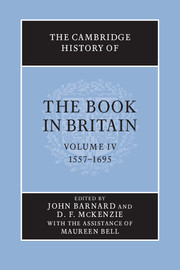Book contents
- Frontmatter
- Dedication
- Contents
- List of illustrations
- List of contributors
- Preface
- Acknowledgements
- Introduction
- RELIGION AND POLITICS
- ORAL TRADITIONS AND SCRIBAL CULTURE
- LITERATURE OF THE LEARNED
- LITERARY CANONS
- VERNACULAR TRADITIONS
- THE BUSINESS OF PRINT AND THE SPACE OF READING
- BEYOND LONDON: PRODUCTION, DISTRIBUTION, RECEPTION
- DISRUPTION AND RESTRUCTURING: THE LATE SEVENTEENTH-CENTURY BOOK TRADE
- STATISTICAL APPENDICES
- Abbreviations
- Bibliography
- Index
- Plate Section
- References
Introduction
- Frontmatter
- Dedication
- Contents
- List of illustrations
- List of contributors
- Preface
- Acknowledgements
- Introduction
- RELIGION AND POLITICS
- ORAL TRADITIONS AND SCRIBAL CULTURE
- LITERATURE OF THE LEARNED
- LITERARY CANONS
- VERNACULAR TRADITIONS
- THE BUSINESS OF PRINT AND THE SPACE OF READING
- BEYOND LONDON: PRODUCTION, DISTRIBUTION, RECEPTION
- DISRUPTION AND RESTRUCTURING: THE LATE SEVENTEENTH-CENTURY BOOK TRADE
- STATISTICAL APPENDICES
- Abbreviations
- Bibliography
- Index
- Plate Section
- References
Summary
The cultural impact of printing and the trade in books was out of all proportion to its economic significance. The importation of white and brown paper for writing, printing and packaging probably generated more profit for its wholesalers than the total output of printed texts did for printers, booksellers, mercuries, bookbinders and related trades, put together. Yet although the British book trade in 1557 was unavoidably insular and parochial when compared with that on the Continent, it offered native writers a closed market which meant that a higher proportion of works in the vernacular were published than was the case abroad. Paradoxically, Britain’s off-shore position, which made it for the most part culturally dependent on the Continent for learned writing of all kinds, privileged the development of its own independent traditions within the ‘four kingdoms’. Printing dramatically accelerated the flow of information in the vernacular, and increasingly did so across class, cultural and national boundaries in the English-speaking world. It played a vital role in a world in which oral, visual, manuscript and printed texts all existed side by side, interacting with one another. Print did not replace manuscript circulation or production: as is the case today, the new technology supplemented earlier ones, partially or largely replacing them for some functions, reinforcing them for others.
- Type
- Chapter
- Information
- The Cambridge History of the Book in Britain , pp. 1 - 26Publisher: Cambridge University PressPrint publication year: 2002
References
- 9
- Cited by

